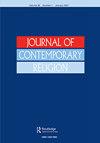走向叙事世俗化的社会学解释学:西班牙宗教转型案例中的世俗故事(1960-2019)
IF 0.6
3区 哲学
0 RELIGION
引用次数: 1
摘要
本文的目的是提出宗教转型研究的一个维度,它可以帮助我们从社会学历史的角度——叙事性——继续讨论世俗化问题。在介绍了支持本研究的概念和方法基础之后,我探讨了一个世俗化的具体案例:1960年至2019年之间的西班牙社会。20世纪下半叶世俗化进程的加速特别浓缩在一系列叙事的孕育中,这些叙事导致了“认识论世俗政权”的形成。本文将反思三个特定历史时刻的特殊性:20世纪60年代末,佛朗哥去世后的一段时间(从1975年到20世纪80年代末),以及21世纪初。我的研究最后确认了叙事世俗化对于从社会历史的角度理解这一过程的重要性,并提出了对叙事维度的研究作为解释其他欧洲社会世俗化加速和扩展的一条线索。本文章由计算机程序翻译,如有差异,请以英文原文为准。
Toward a sociological hermeneutics of narrative secularization: secular stories in the Spanish case of religious transformation (1960–2019)
ABSTRACT The purpose of this article is to present a dimension of the study of religious transformation that can help us to continue the debate on secularization from an approach of sociological history: narrativity. After the presentation of the conceptual and methodological bases that support this study, I explore a specific case of secularization: Spanish society between 1960 and 2019. The acceleration of the secularization process in the second half of the century was particularly condensed in the gestation of a whole series of narratives, which led to the formation of an ‘epistemic secular regime’. This article will reflect on the particularities of three specific historical moments: the late 1960s, the period immediately after Franco’s death (from 1975 until the end of the 1980s), and the beginning of the twenty-first century. My research concludes by confirming the importance of narrative secularization to understand this process from a socio-historical perspective and proposes the study of the narrative dimension as a line of explanation for the particular acceleration and extension of secularization in other European societies.
求助全文
通过发布文献求助,成功后即可免费获取论文全文。
去求助
来源期刊

Journal of Contemporary Religion
RELIGION-
CiteScore
1.20
自引率
0.00%
发文量
59
期刊介绍:
Journal of Contemporary Religion is an international peer reviewed journal. Its purpose is to both document and evaluate the anthropological, sociological, psychological, and philosophical aspects of emerging manifestations of religiosity in any part of the world—whether within innovative movements or mainstream institutions. The term ''religion'' in the title of this journal is understood to include contributions on spirituality. Moreover, as the journal title suggests, the focus is on contemporary issues. Therefore, the editors of Journal of Contemporary Religion welcome submissions which deal with: classical topics in the study of religion, such as secularisation and the vitality of religion or traditional sectarian movements; more recent developments in the study of religion, including religion and social problems, religion and the environment, religion and education, the transmission of religion, the materialisation and visualisation of religion in various forms, new forms of religious pluralism, the rise of new forms of religion and spirituality, religion and the Internet, religion and science, religion and globalisation, religion and the economy, etc. theoretical approaches to the study of religion; discussions of methods in relation to empirical research; qualitative and quantitative research and related issues. The Journal includes reviews of books which reflect the above themes.
 求助内容:
求助内容: 应助结果提醒方式:
应助结果提醒方式:


